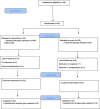Effects of fermentable high fiber diet supplementation on gut derived and conventional nitrogenous product in patients on maintenance hemodialysis: a randomized controlled trial
- PMID: 30911321
- PMCID: PMC6417142
- DOI: 10.1186/s12986-019-0343-x
Effects of fermentable high fiber diet supplementation on gut derived and conventional nitrogenous product in patients on maintenance hemodialysis: a randomized controlled trial
Abstract
Introduction: Gut derived toxins such as p-cresol, p-cresyl sulfate (pCS) and indoxyl sulfate (IS), which belong to protein-bound uremic toxins that promote development of fibrosis inflammatory state associated with chronic kidney disease. One possible way to suppress the production of IS and pCS is to increase dietary fiber intake. The aim of the present study was to assess whether increasing dietary fiber, as high amylose diet, can affect the level of conventional and protein bound nitrogenous products.
Methods: Fifty patients with end stage renal disease (ESRD) on maintenance hemodialysis were randomly assigned to receive a diet containing resistant starch (HAM-RS2) or placebo over 8 weeks spanning February and September 2017 in the 29 Bahman hospital hemodialysis ward in Tabriz, Iran. Of these, 44 patients (23 from HAM-RS2 and 21 control) completed the study. Plasma levels of urea, creatinine, uric acid and other routine parameters were measured at the beginning and after 8 weeks of starting the supplementation. The levels of IS and p-cresol in the collected serum samples were also determined by HPLC at baseline and after intervention.
Results: There was significant reduction of creatinine and uric acid levels in HAM-RS2 supplemented patients when compared with control group (P < 0.05). Serum levels of IS was not changed significantly in both HAM-RS2 treated and control patients, whereas p-cresol level was reduced significantly during the study period in HAM-RS2 treated patients (P = 0.039). The change of other parameters including Hb, lipids, bone markers and hs-CRP were non-significant during the study in both groups.
Conclusion: Administration of fermentable high fiber diet as HAM-RS2 decreased serum levels of some nitrogenous products such as serum creatinine and p-cresol as a gut derived nitrogenous product without change in IS levels in maintenance hemodialysis patients. Due to safety, without important side effects the administration of diet enriched with fermentable fiber is suitable for patients on maintenance dialysis.
Keywords: Chronic kidney disease; Dietary; Gut microbiota; P-cresol; Short chain fatty acid.
Conflict of interest statement
The study protocol was approved by the Human Subjects Institutional Review Board at Tabriz University of Medical Sciences (TUOMS), Tabriz, Iran (IR.tbzmed.rec.1397.442).“Not applicable”.“The authors declare that they have no competing interests.”Springer Nature remains neutral with regard to jurisdictional claims in published maps and institutional affiliations.
References
-
- Kafeshani M. The gut microbiome, diet, and chronic kidney disease. J Prev Epidemiol. 2017;2:e05–e09.
-
- Vaziri ND, Liu SM, Lau WL, Khazaeli M, Nazertehrani M, Farzaneh SH, Kieffer DA, Adams SH, Martin RJ. High amylose resistant starch diet ameliorates oxidative stress, inflammation, and progression of chronic kidney disease. PLoS One. 2014;9:e114881–e114895. doi: 10.1371/journal.pone.0114881. - DOI - PMC - PubMed
LinkOut - more resources
Full Text Sources
Research Materials
Miscellaneous


